Why does prevention matter?

Prevention is very important to make sure more young people don’t get infected with HIV or give it to others. In other words, “HIV PREVENTION STARTS WITH US.”
To stop new HIV infections, we need to take the following responsible steps:
- 1. Know Your HIV Status: The ONLY way to know if you have HIV is by getting tested. HIV Testing is fast, very private and free, and you can receive HIV Testing and counselling services at any Healthcentre of your choice.
- It is normal to feel worried or scared about your HIV test result, but don’t let that stop you from testing. It is better to know your status than to be unsure and risk infecting others, or falling ill and later dying.
- If your result is positive, you can start treatment early and still have a normal and productive life. E.g. the famous American Basketball legend, Magic Johnson, has been living with HIV for nearly 30 years. He is a successful businessman who is married with kids!
- If you are in a relationship, you cannot use your boyfriend/girlfriend’s HIV test result so determine your HIV status – That’s like saying you don’t need to sit for your school exams because your best friend is sitting for the same exam, crazy right? However, you can support each other by going for the test together.
- There are skilled counselors in every Healthcentre to guide and educate you before and after you take the test – feel free to talk with them.
- In some cases and countries, adolescents below a certain age will need the permission or approval of a parent, guardian or caregiver before they can test.
I know what you are thinking… “If my result is positive, can I ever find love, get married or have kids?”

Yes! You absolutely can! There are many people living with HIV who are in loving relationships or married to people who are negative, and have kids that are negative too (Remember, Magic Johnson?). They are called Sero-discordant couples. However, this is only possible if you are on treatment, and the first step is getting tested! It is also important for partners who are HIV negative to support their HIV positive partners to stay and adhere to treatment.

2. Abstinence /Delay Sexual Debut: You should never be in a hurry to have sex, especially if you are not ready. It is wrong for your boyfriend/girlfriend, or anyone to force you to have sex against your wish because that can expose you to unplanned pregnancies, and Sexually Transmitted Infections (STIs). It is against the law to have sex with anyone without his or her consent (agreement). In a healthy relationship, you don’t need to have sex if you don’t want to. Feel free to talk with your partner about your decision and let him/her know why you want to wait longer before you have sex.
Never let anyone pressure you into having sex; it is okay to say NO! Remember, Sex can wait, but HIV, STIs, or unplanned pregnancy won’t! If he/she can’t wait until you are ready, then they don’t deserve you.


3. Condom Use: If you are already sexually active, then you must know that Condoms should be your best friend right? Correct and consistent use of condoms does not only protect you from HIV/STIs, but also unplanned pregnancies. There is nothing cool about having unprotected sex; it is like going out in the rain without a raincoat or an Umbrella. If your partner doesn’t want to use Condoms or pressures you not to use them, then it could be a sign that they are careless about their health and do not care enough about you and your health too!

Wondering how to use a Condom? We’ve got you covered!
How to use A Male condom
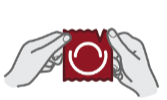 Push the condom aside and carefully open the packet with your hand
Push the condom aside and carefully open the packet with your hand
 Only put on the condom when your penis is fully erect
before there is contact with your partner’s body.
Only put on the condom when your penis is fully erect
before there is contact with your partner’s body.
 Squeeze the tip of the condom when putting it on.
While still holding the tip, roll the condom over the
whole length of your penis with the other hand.
Squeeze the tip of the condom when putting it on.
While still holding the tip, roll the condom over the
whole length of your penis with the other hand.
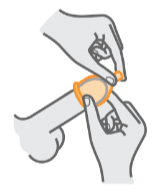 Only use water based lube with condoms. Oil based products will
break down the latex.
Only use water based lube with condoms. Oil based products will
break down the latex.
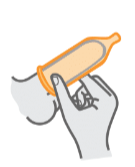 When you are done hold on to the base of the condom
and withdraw while your penis is still stiff.
When you are done hold on to the base of the condom
and withdraw while your penis is still stiff.
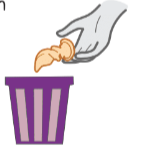 Dispose the condom properly. Do not re-use condoms.
Dispose the condom properly. Do not re-use condoms.

Girls use condoms too!
How to use A Female condom
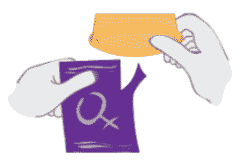 Carefully open the packet with both hands
Carefully open the packet with both hands
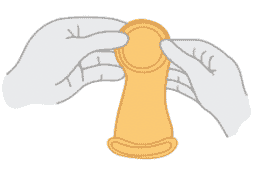 The thick, inner ring with closed end is used for placing in the vagina and holds condom in place. The thin, outer ring remains outside of body, covering vaginal opening
The thick, inner ring with closed end is used for placing in the vagina and holds condom in place. The thin, outer ring remains outside of body, covering vaginal opening
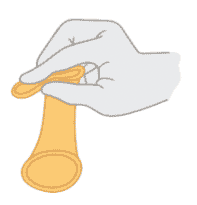 Find a comfortable position. While holding outside of condom at closed end, squeeze sides of inner ring together with your thumb and forefinger and insert into vagina. It is similar to inserting a tampon
Find a comfortable position. While holding outside of condom at closed end, squeeze sides of inner ring together with your thumb and forefinger and insert into vagina. It is similar to inserting a tampon
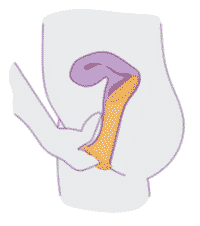 Using your finger, push inner ring as far up as it will go until it rests against cervix. The condom will expand naturally and you may not feel it.
Using your finger, push inner ring as far up as it will go until it rests against cervix. The condom will expand naturally and you may not feel it.
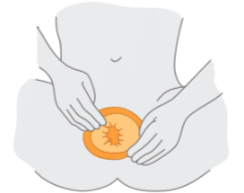 Ensure the condom is not twisted. The thin, outer ring should remain outside vagina
Ensure the condom is not twisted. The thin, outer ring should remain outside vagina
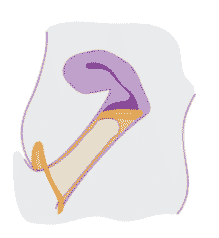 Guide partner’s penis into opening of female condom. Stop intercourse if you feel penis slip between condom and walls of vagina or if outer ring is pushed into vagina.
Guide partner’s penis into opening of female condom. Stop intercourse if you feel penis slip between condom and walls of vagina or if outer ring is pushed into vagina.
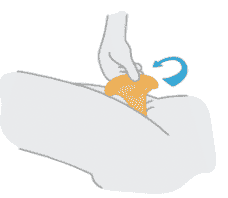 To remove, gently twist outer ring and pull female condom out of vagina.
To remove, gently twist outer ring and pull female condom out of vagina.
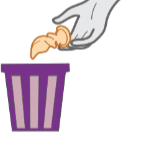 Throw away female condom in trash after using it one time. Do not reuse
Throw away female condom in trash after using it one time. Do not reuse

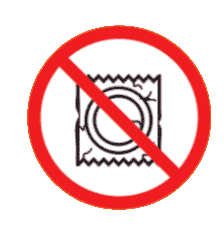 Do not use expired Condom
Do not use expired Condom
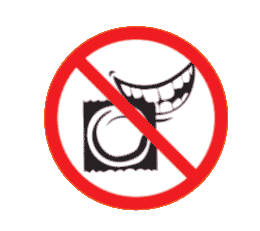 Do not use your teeth or sharp objects to unwrap the condom.
Do not use your teeth or sharp objects to unwrap the condom.
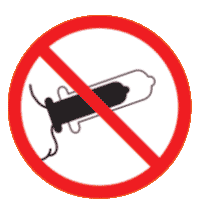 Do not double the Condoms before use. Use one Condom each time you have sex
Do not double the Condoms before use. Use one Condom each time you have sex
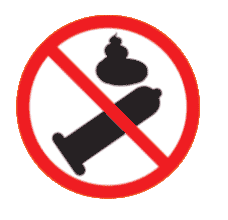 Do not use petroleum jelly – they can easily break the condoms. Instead use Lubes
Do not use petroleum jelly – they can easily break the condoms. Instead use Lubes
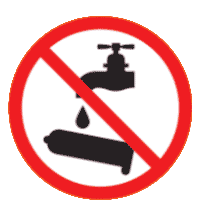 Do not wash or re-use Condom
Do not wash or re-use Condom

One more thing guys, you need to protect yourself by practicing safer sex - always use a Condom. Sex can still be fun with Condoms
You can get both male and female Condoms for free at a Healthcentre close to you. However, if you are far from the Healthcentre and have some money , you can buy Condoms from the nearest pharmacy or drug store.
If you experience reaction on your skin because of the Condom material, please see a healthcare provider immediately.
4. Avoid risky behavior: Young people are adventurous; but if it puts you at risk, then it is not worth it! Risky behaviors like; drug use, excess alcohol consumption, multiple sex partners, dating older men/women and marathon sex parties like (Vuzu, Orgies, White party etc.) among others increase your chances of contracting HIV or STIs or becoming pregnant. You can still be popular, cool and trendy without engaging in practices that put your health and life in danger.
- Dating Older men/women: In many countries, the practice of dating older men or women has different names e.g., Sponsor, Blesser, Sugar Daddy/Mummy, and Aristo among others. While these kinds of relationships can get you expensive gifts, all expense paid trips to nice places, fancy shoes, bags, clothes and more you must remember:
- They may want something in exchange that you don’t want to give like sex.
- It may be hard for you to express your choice of using condoms, because they will be in control.
- They could be living with HIV or have STIs, and if you are unable to convince them about using Condoms, you will be exposing yourself to HIV infection or other STIs.
- You may not be the only one they are dating or having sex with, which increases your risk of getting infected.
- Even if your friends are dating older men/women, you have the right to decide what is right for you. Material relationships are dangerous and don’t last long – they are not a true expression of love.

Never let anyone pressure you into having sex; it is okay to say NO! Remember, Sex can wait, but HIV, STIs, or unplanned pregnancy won’t! If he/she can’t wait until you are ready, then they don’t deserve you.
Sexually Transmitted Infections (STIs): They are also called Sexually Transmitted Diseases (STDs). These are infections that are spread through sex (oral, vaginal or anal). They include; Syphilis, Gonorrhea, Chlamydia, Trichomoniasis, Hepatitis B, Herpes, Human Papillomavirus (HPV) HIV and many others.
Did you know that there are more than 1 million new STI transmissions everyday? 😱

This is a lot of STIs in one day and it means anyone and everyone can get infected if they do not protect themselves.
While some of these infections can be cured, others like Hepatitis B and C, Herpes, HPV and HIV cannot be cured.
Many STIs can also be transmitted from mother to child during pregnancy and childbirth.
A person can have an STI without knowing. However, if you notice the following: smelly discharge from your vagina, pain or discomfort when peeing for men/women, abdominal pain and itching, please visit the nearest Healthcentre immediately. If you test positive for an STI, encourage your partner to also get tested and treated to avoid re-infection.
This is a lot of STIs in one day and it means anyone and everyone can get infected if they do not protect themselves.


Okay guys, even after you have been circumcised, don’t forget to use Condoms every time you have sex. Circumcision is advised for young men who are HIV negative.
5. Voluntary Medical Male Circumcision (VMMC): YoDid you know that circumcision reduces a boy/man’s risk of getting HIV by 60%?
If you are not circumcised, then you need to take the step and visit the nearest Healthcentre to find out more. You can also talk to your parents/guardian about why it is important for you to get circumcised.
- You can choose the surgical or non-surgical procedure.
- It is fast, easy and safe.
6. Prevention-of-Mother-To-Child-Transmission:
As a young pregnant woman you can prevent your unborn baby from getting infected by doing the following:
- Get Tested for HIV
- Visit the clinic regularly during pregnancy, delivery, and after
- If you are HIV positive, take your HIV medicines. This is very important because it will keep you healthy and help protect your baby from getting infected.
- Eat a healthy and balanced diet - especially fruits and vegetables.
- Talk to the healthcare provider about the kind of food to eat after you give birth and for your baby.


Your unborn baby is a treasure, do your best to protect them from HIV. Imagine a world where no baby is born with HIV…an HIV free generation is possible!
Other things to note:
- 7. Do not share used sharp objects, or touch body fluids like urine, blood, vaginal fluids, semen and poo with your bare hands.
- 8. PEP: PEP stands for Post Exposure Prophylaxis: It is a 28 day course of ARVs taken as soon after exposure as possible, which helps the body fight the virus and stops you from being HIV+. It is ONLY used for emergency cases where a person may have been exposed to HIV infection, e.g. if a young girl (or boy) who is HIV negative gets raped, they need to visit the nearest clinic within 72 hours after the incident to request for PEP. It can also be used to prevent HIV due to exposure to blood at an accident scene or even if a condom breaks during sex and you aren’t sure of the person’s status.

If you (or someone you know) gets raped, please, insist that you are taken to the nearest Healthcentre immediately and ask for PEP within 72 hours of exposure. It is Free! If you need other prevention options such as PrEP, please speak to a counselor.